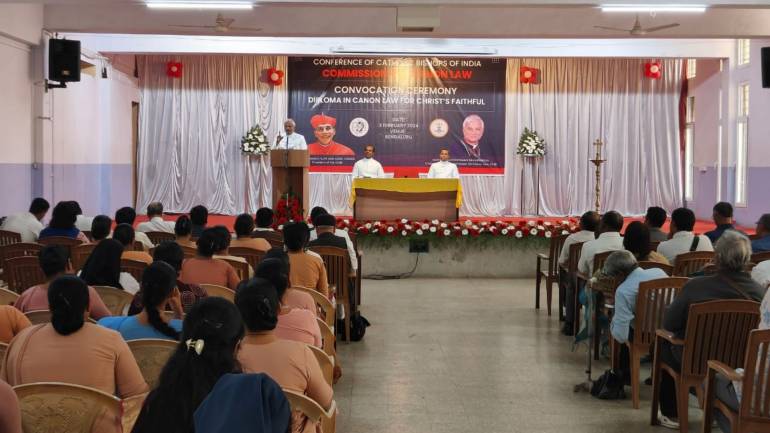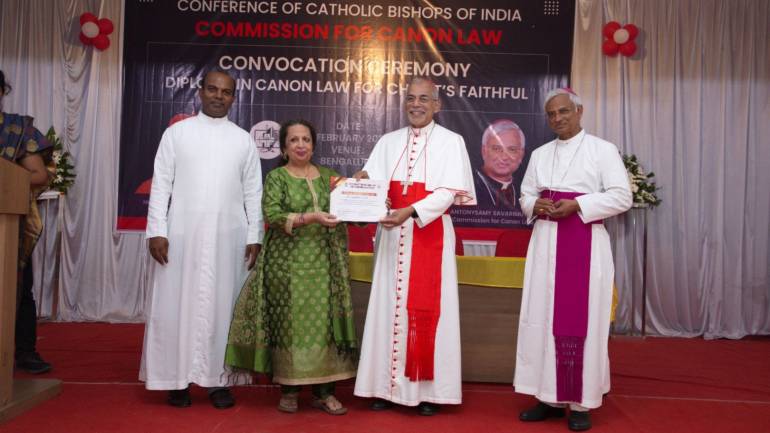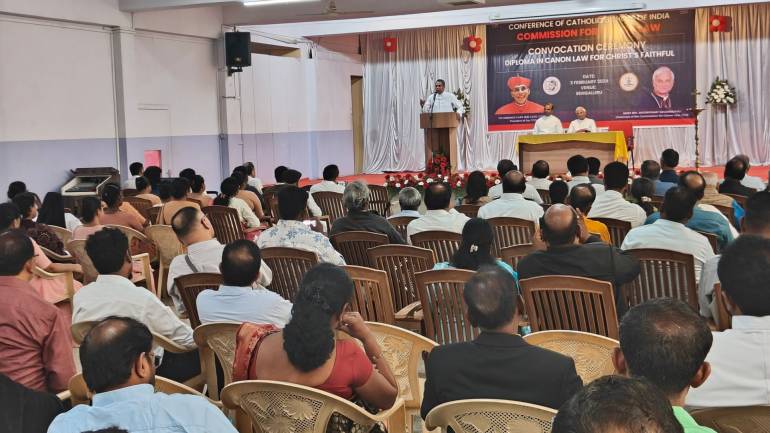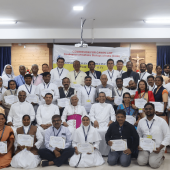Over 400 laypeople finish Diploma Course in Canon Law for laypeople
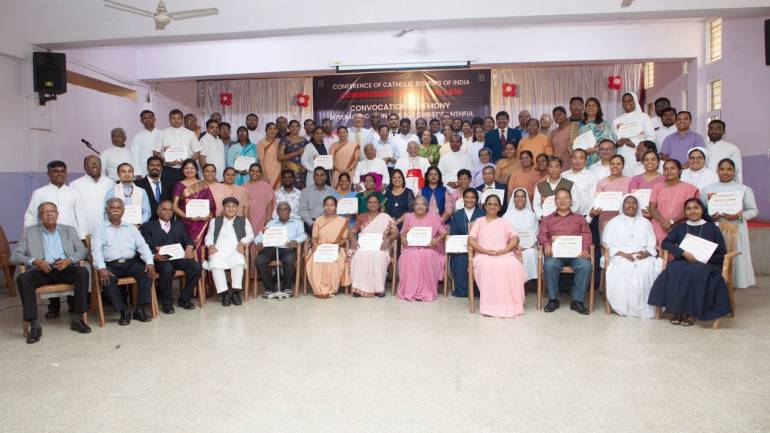
The Indian bishops' organized Canon Lay for Laity diploma course had as many as 437 lay participants from 23 nations.
The convocation ceremony, which took place on February 3, 2024, in Bangalore, formally acknowledged the participants' dedication and achievements, marking the culmination of this impactful annual diploma program.
Father Dr. Merlin Rengith Ambrose, DCL, the Executive Secretary of the Commission for Canon Law in the Conference of Catholic Bishops of India (CCBI) and professor of Canon Law at St. Peter’s Pontifical Institute, meticulously orchestrated this momentous occasion of the convocation ceremony, wherein all the participants were awarded diplomas in Canon Law.
Two formative sessions took place on the day of convocation. Rev. Dr. John Mendonca DCL spoke of laypeople being co-responsible in the activities of the church to create a synodal church and emphasized the need for their proper formation for their synodal participation.
Alex Vadakumthala, Bishop of Kannur and a Canon Lawyer mentioned the importance of participatory structures such as the Parish Pastoral Council, Parish Finance Council, Diocesan Pastoral and Finance Council, Diocesan Synods, Diocesan Pastoral Council, and other Commissions wherein the lay people could commit themselves to render their mission and participation to blossom the synodal church in India.
The distinguished Filipe Neri Cardinal Ferrao, President of the Conference of Catholic Bishops of India (CCBI), bestowed certificates upon the participants, offering his heartfelt congratulations.
In his address, he eloquently reaffirmed the crucial need for such initiatives, underscoring how equipping laypeople with knowledge of Canon Law empowers them to contribute meaningfully to the Church and its participatory structures.
Bishop Antony Savarimuthu (chairman of the Commission for Canon Law in CCBI) graced the convocation ceremony and delivered a compelling address, emphasizing the paramount importance of lay involvement within the Church and the significance of Canon Law as an instrument of faith.
The annual online Diploma Course in Canon Law for laypeople stands as a resounding success, leaving a legacy of canonically empowered individuals and a revitalized spirit of synodal collaboration within the Catholic Church.
Through the dedicated efforts of its organizers, esteemed faculty, and eager participants, this program has paved the way for a brighter future where laypeople, equipped with knowledge and a newfound sense of agency, actively contribute to the church’s mission and its ongoing synodal journey.
Father Merlin Rengith Ambrose, the Executive Secretary of the Commission for Canon Law in CCBI and the Professor of Canon Law at St. Peter’s Pontifical Institue, Bangalore, meticulously organized the Annual Diploma Course in Canon Law for one full year and the final grand convocation ceremony that embraced 437 participants from 23 countries.
The Conference of Catholic Bishops of India appreciates the Commission for Canon Law for their noble and first-ever new initiative in Canon Law for the blooming of the Synodal Church.
Pope Francis considers the connection between canon law and the synodality of the Church to the extent that the synodal spirit must be lived in every aspect of lay people’s juridical duties by way of their communion, participation, and mission in dioceses and parishes.
Many signs indicate that the Spirit is empowering them for an even greater role in the coming millennium. One crucial area where lay persons are to cooperate with the sense of synodal co-responsibility is in the life of the church. Lay persons can contribute to the life of the church by receiving ministries or participating in the consultation and decision-making process in committees and councils, thus paving the way for the Synodal Church.
Therefore, conducting formation programs exclusively for the laity is necessary to create awareness about their particular vocation and mission based on communion, mission, and participation.
Summary Report of the First Session of the Sixteenth Ordinary General Assembly of the Synod of Bishops (October 4-29, 2023), in its introduction, emphasizes this need to deepen canonical knowledge.
The Commission for Canon Law within the Conference of Catholic Bishops of India (CCBI) held a comprehensive annual online diploma course in Canon Law for laypeople from December 10, 2022, to January 10, 2024.
The course was diligently and meticulously organized and conducted by Father Merlin Rengith Ambrose, DCL, both Executive Secretary of the Commission for Canon Law in CCBI and Professor of Canon Law at St. Peter’s Pontifical Institute, Bangalore, under the very able guidance of Bishop Antonysamy Savarimuthu, the Chairman of the Commission.
The course format consisted of sessions held every second and fourth Saturday of the month. Oswald Cardinal Gracias, the Archbishop of Bombay, graced this inaugural session with his esteemed presence. In his opening address on December 10, 2022, he eloquently emphasized the crucial role of Canon Law education in empowering laypeople to embrace a more active role within the Church's ongoing synodal process.
Bishop Arulselvam Rayappan, in the inaugural session, underscored the necessity for lay persons to acquire a profound understanding of canon law and further emphasized the instrumental role it plays in fulfilling parochial and diocesan responsibilities and guiding lives following the Church’s magisterium.
This inaugural event of the Annual Diploma Course in “Canon Law for a Synodal Church” for lay people set the stage for a program teeming with eager participants—a total of four hundred and 437 lay people hailing from 23 countries across the globe embarked on this enriching journey.
They actively participated in the classes held every second and fourth Saturday.
To realize Pope Francis' vision of a synodal church, the curriculum delved into the fundamental elements of laypeople's canonical rights and obligations. This provided insightful information about their communion, mission, and participation within the church.
An overarching theme, echoing the teachings of the Second Vatican Council, underscored the crucial importance of fostering communion within the Church and its anchoring in relevant juridical foundations.
Notably, the program equipped laypeople with a comprehensive understanding of Canon Law, thus empowering them to actively engage within the participatory structures of dioceses, parishes, and other ecclesial institutions.
This annual online diploma course stands as a powerful tool in fostering the development of synodal thinking among laypeople.
The esteemed teaching faculty for this course comprised Cardinals, Archbishops, Bishops, and renowned Professors of Canon Law from India and abroad, lending their invaluable expertise to each session.
This esteemed pool of instructors resulted in highly acclaimed sessions that proved immensely fruitful for the participants.
Radio Veritas Asia (RVA), a media platform of the Catholic Church, aims to share Christ. RVA started in 1969 as a continental Catholic radio station to serve Asian countries in their respective local language, thus earning the tag “the Voice of Asian Christianity.” Responding to the emerging context, RVA embraced media platforms to connect with the global Asian audience via its 21 language websites and various social media platforms.





